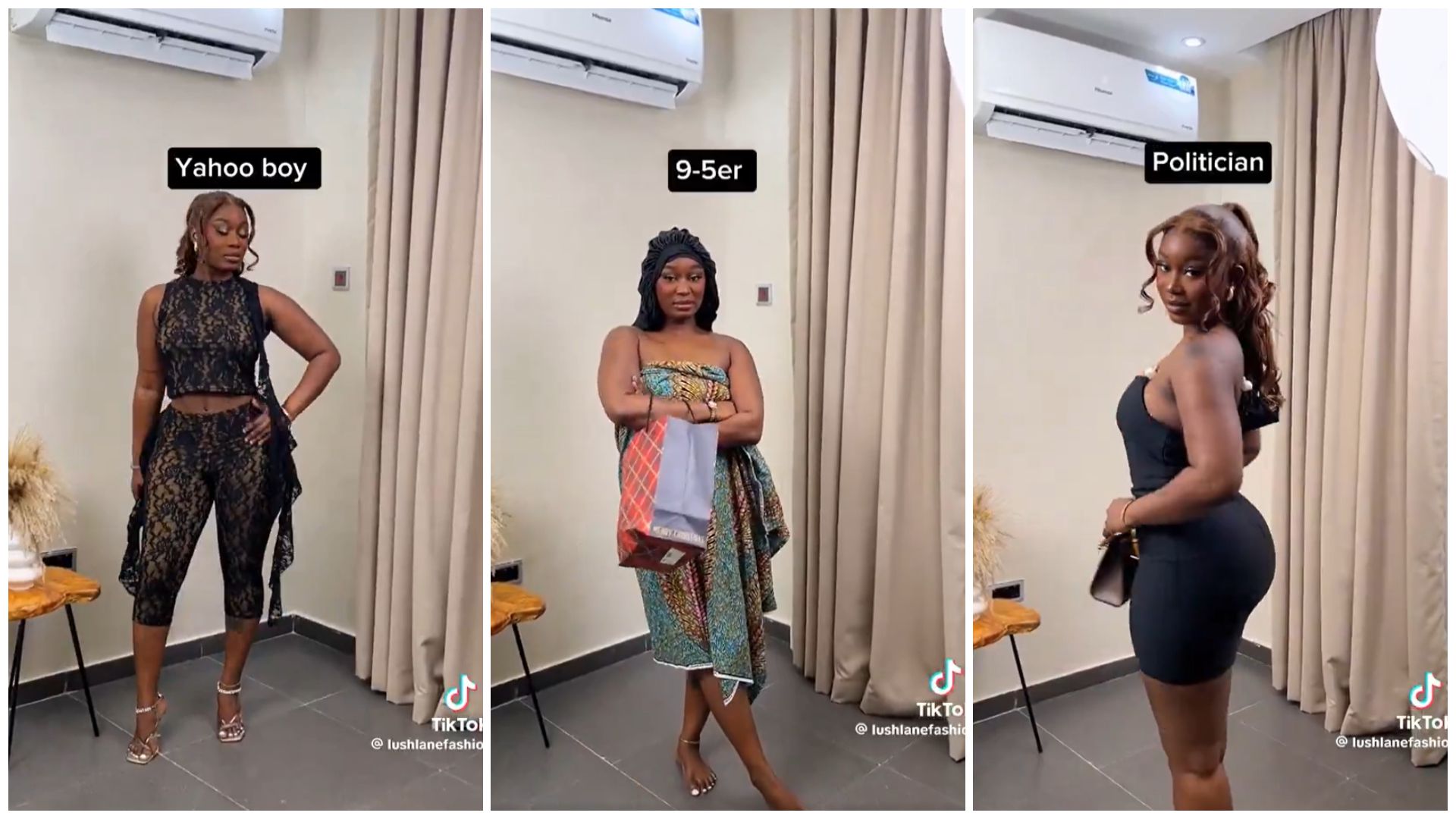
If you’ve scrolled through Nigerian Twitter (X) or TikTok lately, you’ve probably seen the trend. A young woman dresses up for different “types” of men: the politician, the tech bro, the Yahoo boy, in sleek gowns, designer bags, and heels. But when it’s time to “dress for the 9–5 guy,” she throws on a wrapper, wears a bonnet, and looks intentionally unbothered.
The message is loud: 9–5 men aren’t worth the effort.
J u s t i c e for 9/5 guys 😭 pic.twitter.com/iltE3itEEG
— Boboye (@namelessD_) October 1, 2025
It was meant to be funny, but it struck a nerve. The comments were flooded with arguments about how money, class, and masculinity have been redefined in today’s dating culture. “When did honest work stop being attractive?” many ask.
The new social hierarchy of men
In Nigeria’s social pyramid, money has long been a form of power, but now, it’s also a form of sex appeal. The politician represents influence and access. The tech bro symbolises innovation, soft life, and global relevance. The Yahoo boy, despite his criminality, is portrayed in pop culture as flashy and “generous.”
The 9–5 man, on the other hand, the one counting down to salary day, hustling through Lagos traffic, and living paycheck to paycheck, is seen as financially limited, struggling to “make it,” and by extension, less desirable.
What’s fascinating, though, is that this perception doesn’t just come from shallow materialism. In our society, money is a means of survival. Nigeria’s economy is brutal, and many women are tired of struggling. If dating a certain kind of man promises financial stability or a softer life, can you really blame them for choosing comfort over potential?
Many Nigerian women aren’t anti–9–5; they’re anti–struggle. Years of “building with a man” stories that end in betrayal or disappointment have left scars.
Building with a man is easily one of the greatest disservice you can ever do to yourself.
They will make you regret it😕 https://t.co/ZvXi5e13Xn— Hvrri3t!✧ (@harr1ezsq) June 16, 2025
Many Nigerian women have watched their mothers suffer with men who had good hearts but no money; now, they want to make “smarter” choices.
To them, marrying potential feels like a gamble they’re not willing to dabble in.
How we glorify the end and not the process
This mentality, where only visible wealth earns respect, has become the norm. The success stories we celebrate are often the flashy ones. We rarely glorify the man who works hard, pays his bills, and builds slowly. Instead, we praise the ones who “blow.”
From music to Nollywood, the rich guy gets the girl. The poor, hardworking man gets pity or humiliation. In that sense, the woman dressing in a wrapper for a 9–5 man is reflecting the already existing narrative.
Yet, there’s an irony here. Those “soft life” men that women claim to prefer (tech bros, politicians, or businessmen) are 9–5 men too, just at higher levels. They also report to bosses or investors, keep office hours, and chase deadlines. The only difference is income and social perception.
And in Nigeria, status often outweighs substance.
Survival and gender pressure
It’s easy to dismiss these preferences as greed, but many women are reacting to a system that punishes female vulnerability. Nigeria’s gender imbalance means a woman’s financial dependence can quickly turn into emotional or physical powerlessness.
So, when women say they don’t want “average men,” it’s a survival strategy, not just vanity. Okay, maybe a bit of vanity. But primarily, survival.
On the flip side, this mindset also puts crushing pressure on men. The broke-shaming culture, where a man’s worth is tied to his wallet, pushes many into fraud, illegal business, or unsustainable lifestyles. Men feel the need to “prove” themselves before being taken seriously, and that race for validation can destroy lives.
The social media illusion
Platforms like TikTok and Instagram have only intensified this divide. We see curated versions of success like the influencer couple in Paris, the tech bro with his Tesla, and the slay queen unboxing her new iPhone 17.
This creates a false reality where the average Nigerian feels inadequate just for being normal.
As one X user wrote,
I don’t know 🤷 how 9-5 got a bad pr. When did labor become a shameful thing! Or working for people. You see a man genuinely striving, and you are comparing him to Tik tokers that dance for money. We actually need more people to talk. The comments I see on some of these posts?bad
— Temilade Salami | Environmentalist (@theglobaltemi) October 4, 2025
That frustration is valid. Honest work is now treated like an insult, especially if it doesn’t translate into luxury.
Between ambition and values
The truth is, there’s nothing wrong with wanting comfort. Everyone wants a good life. But there’s a fine line between wanting stability and disrespecting effort.
Maybe the real problem isn’t women wanting more; it’s that we’ve made “more” the only thing worth having. And that’s where the conversation about dating, money, and status in Nigeria needs to shift.








